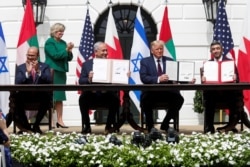Israeli Prime Minister Benjamin Netanyahu’s signing Tuesday of peace deals with two Arab states – the United Arab Emirates and Bahrain – in Washington doubles the number of Arab countries that have made peace with Israel. In Tel Aviv, the city government building was lit up with the word “peace” in Hebrew, English and Arabic. For Palestinians, it is a dark day.
Israelis have warmly welcomed the announcement of peace deals with both the United Arab Emirates and Bahrain and the promise of more states to follow. Yossi Beilin is a former Israeli official and longtime negotiator with the Palestinians.
“It’s a very special day, very important day. One of the ideas out of the vision of Zionism was to be part of the Middle East and not to be a lonely state in it. It was very, very difficult to demand it but gradually it is happening and today it is another important milestone in the direction of being a part of this region.”
Israelis have already begun planning vacations in Dubai, and there is talk of dozens of business deals in the works.
For Palestinians, it is close to a nightmare. Although the UAE said it only signed the deal after Israel agreed to drop plans to annex close to a third of the West Bank, Palestinian Prime Minister Mohammad Shtayyeh described the signing ceremony as a “black day that will be added to the Palestinian calendar of pain.”
Long-time negotiator Yossi Beilin said the deal could offer new opportunities for a deal with the Palestinians.
“Four Arab countries, members of the Arab league are having peace with Israel, are having normal relations with Israel. So we are expecting these Arab countries to shuttle between Jerusalem and Ramallah, to talk to both sides, to see whether bridges can be built for whatever, whatever kind of an agreement, and there are different options for a permanent agreement, for an interim agreement. I believe in the idea of an Israeli-Palestinian confederation but of course it is not the only option.”
But as longtime Palestinian negotiator Saeb Erekat sees it, Israel and the UAE are forming a new military pact.
“The Bahrain-American Israeli agreement to normalize relations is now part of a bigger package in the region. It’s not about relations between countries. We are witnessing an alliance, a military alliance being created in the region, maybe they want to call it an Arab-Israeli NATO.”
Some Israeli analysts see it as Israel and the Gulf States sharing a common enemy: Iran. Gerald Steinberg is a former professor of political science at Bar Ilan University.
“The fact that the small Gulf states that are very much the Arab Gulf states starting the UAE in particular, the UAE, Bahrain, Oman, the Saudis themselves which are not a small state, but the threat of Iran is the glue that holds this all together. It’s both a common interest but also the shared threat perceptions of a triumphalist Iran seeking nuclear weapons, and the United States, largely, in terms of military capabilities withdrawing from the region, that’s the perception.”
For both U.S. President Donald Trump and Prime Minister Netanyahu, the deal was an achievement. For Netanyahu it was also a way to avoid the growing numbers of COVID-19 cases, which has reached a new high of 5,000 daily cases.
On Friday Israel goes to a new three-week lockdown to try to contain the pandemic.





